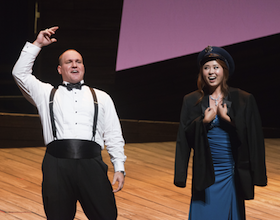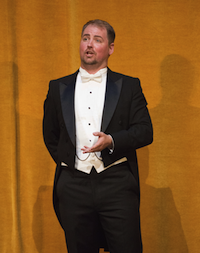
Photos by Kristen Loken
Year after year since 1957, the San Francisco Merola Opera Program closes its 10-week intense training of talented young artists with fireworks of excellence and promise. The list of acclaimed artists launched by Merola is in the hundreds and still growing. The reputation of the program and the future of their careers seems assured by the performance of 22 singers and six apprentice coaches and stage directors Saturday night.
To understand the challenge and accomplishment of the Merola Grand Finale 2014, consider only the physics of it. The youngsters who started singing about 20 years ago in their shower, slowly progressed, reaching Merola's coaching and rehearsals in small rooms, then performances in a school auditorium, and auditions in the Opera House Chorus Room — where audiences hearing them at close or medium range, wondered if he or she could really fill one of opera's monster halls.
The War Memorial — smaller than the Metropolitan Opera or Chicago Lyric Opera — was the venue of their final test and graduation. Success! Almost all the singers projected their voices powerfully into the War Memorial's enormous space: a 3,146-seat auditorium with a volume of about one-million cubic feet, and performing as if born to that huge stage — 134 feet wide x 84 feet deep x 140 feet in total height.
It takes vocal strength and expert projection as a basic requirement, even before adding musicality, beauty of tone, clear diction, and convincing acting in a variety of roles to make magic happen. In the blessedly amplification-free world of (some) opera houses, you must be heard before anything else.
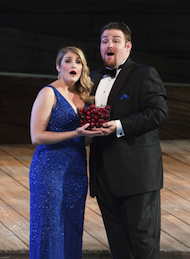
The official opening and closing of the nearly three-hour-long concert was the rousing overture to Verdi's Nabucco and an unusually short excerpt from the final scene of Verdi's Falstaff. But that was the work of the orchestra (playing splendidly after summer vacation, under Ari Pelto's vivid direction) and chorus (of Merolini), respectively. Not what the large audience, as many as 2,000, came for: to hear emerging singers.
The remarkable arc of singing began with Thomas Gunther's self-assured, elegant, and properly Gallic and playful performance of the Prologue to Poulenc's La mamelles de Tirésias and ended gloriously in the ecstatic Cherry Duet from Mascagni's L'amico Fritz, tenor Casey Candebat giving his appealing best and the class' most famous soprano, Metropolitan-bound Julie Adams, dazzling with her voice, not quite the simple peasant girl as the music describes Suzel. Adams' fabulous voice could be — will be — much enhanced by more unrestrained expression in voice and acting.
Still, carried on the silken carpet of the orchestral accompaniment, this great romantic scene — unfortunately the opera's single true high point — swept the audience away.
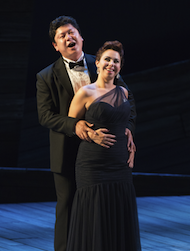
Candebat was in an unusual minority: At Merola events — as in all opera — the expectation is for sopranos and tenors to shine the brightest. On this evening, baritones and basses were right up there — eight of them, a larger proportion of the group than usual.
Baritone Gunther began the string, followed by baritone Edward Nelson's Hamlet (from Ambroise Thomas' opera), then baritone Gideon Dabi in the Rigoletto Quartet and an aria from Leoncavallo's Zazà; baritone Alexander Elliott's Silvio (from Leoncavallo's I Pagliacci, bass-baritone Szymon Wach's Alidoro (from Rossini's La Cenerentola), and bass-baritone Matthew Stump in Stravinsky's The Rake's Progress. All were first class.
Of course, lower voices had no monopoly in pleasing the audience. Add to Candebat's success tenor Chong Wang's breakthrough Duke in Rigoletto, triumphing in the treacherously transparent "La donna e mobile," tenor Benjamin Werley's conquest of Tom Rakewell's backbreaking role in The Rake's Progress, and — of course — the ladies besides Adams.
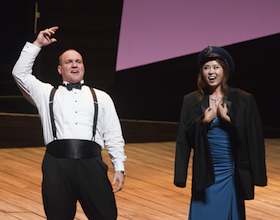
Soprano Karen Chia-ling Ho's was a moving Margherita in a scene from Boito's Mefistofele, Yujin Kim utterly charming, with good projection of a relatively small instrument, as Marie in Donizetti's The Daughter of the Regiment, Nian Wang's strong Sesto in Mozart's La Clemenza di Tito, Shirin Eskandani's Composer from Strauss' Ariadne auf Naxos (once again with a terrific orchestral performance), Maria Fasciano's big-voiced Nedda in I Pagliacci, and the pre-intermission showstopper of Eliza Bonet's extravagant Duchesse from Gerolstein.
Programming was excellent, mixing warhorses and relative rarities, boldly excluding the wonderful but terribly overplayed Puccini altogether. A last-minute decision to drop a scene from Lucrezia Borgia was wise. Staging on the Susannah set, two slanted walls forming a helpful acoustical shell, was restrained and appropriate by Israeli apprentice stage director Omer Ben-Seadia. Unlike others in the past, she avoided the temptation to turn a concert performance into a "big production" by whatever means, taking the focus away from the music and the singers.
As Ben-Seadia has already directed Don Pasquale successfully, I'd hope she will be invited to stage the Donizetti comedy for Merola next year, scheduled along with a double-bill of The Medium and Gianni Schicci.

